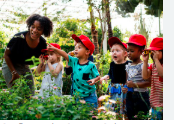Music plays a powerful and enriching role in the early stages of a child’s development. Beyond entertainment, it serves as a valuable tool for enhancing cognitive growth, social interaction, emotional expression, and language skills in young learners. When introduced in age-appropriate ways, music can support well-rounded development and create a joyful learning atmosphere.
Cognitive and Memory Benefits
Research has shown that children exposed to music regularly tend to develop stronger memory and attention skills. Songs with repeating patterns, rhymes, and rhythms help young minds absorb new information. For example, alphabet songs and counting tunes make it easier for preschoolers to remember letters and numbers, transforming abstract concepts into something tangible and fun.
Language and Communication Skills
Singing encourages children to listen closely, pronounce words clearly, and expand their vocabulary. Simple songs often introduce new phrases and sentence structures, helping children build verbal skills without pressure. Music also supports auditory discrimination—the ability to hear differences in sounds—a critical skill for learning to read.
Emotional and Social Development
Music offers a safe and creative outlet for expressing emotions. Through singing, dancing, and rhythm-based games, children can communicate feelings they may not yet have the words to express. Group music activities promote cooperation, turn-taking, and empathy as children sing or play instruments together, learning to listen and respond to others.
Motor Skill Coordination
Clapping hands, stomping feet, or moving to a beat improves both fine and gross motor skills. Playing instruments such as tambourines, xylophones, or drums helps develop hand-eye coordination and timing. These physical movements, paired with music, contribute to better body awareness and self-control.
Creativity and Imagination
Music stimulates the imagination. Whether children are making up their own songs or moving like animals during a music game, they learn to think creatively. This imaginative play supports critical thinking, problem-solving, and the ability to explore new ideas—skills that are essential for lifelong learning.
Creating a Musical Learning Environment
Parents and educators can easily incorporate music into daily routines. Singing during cleanup, using background music during reading time, or engaging in weekly rhythm games helps normalize music as part of the learning experience. Importantly, the focus should remain on enjoyment and exploration rather than performance or perfection.
Conclusion
Introducing music in early childhood education brings numerous developmental benefits. It strengthens brain function, nurtures emotional health, and builds essential communication skills—all while keeping learning playful and engaging. By making music a part of everyday activities, caregivers and teachers lay the foundation for a child’s lifelong love of learning.














